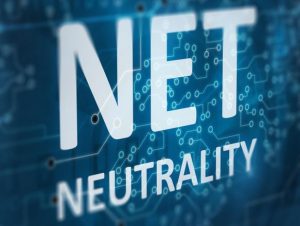In October the Federal Communications Commission pushed the question of net neutrality protection back to the individual states. In other words, it upheld the Federal Communication Commission’s  decision to deregulate internet broadband companies. As a result ISPs can block or slow your access and charge you for faster access. The ISPs have huge lobbying forces that can be a “David and Goliath” situation as states try to negotiate for better consumer services and protection. Approximately three dozen states have passed legislation to protect consumers from abuse from ISPs. At the same time, the lack of a national net neutrality policy moves the US closer to a fractured communication service in the future, while creating greater divides between an open internet and growing “splinternet”. Luckily consumers still have a tool to beat net neutrality . A solid Virtual Private Network (VPN) can stop throttling and secure their data..
decision to deregulate internet broadband companies. As a result ISPs can block or slow your access and charge you for faster access. The ISPs have huge lobbying forces that can be a “David and Goliath” situation as states try to negotiate for better consumer services and protection. Approximately three dozen states have passed legislation to protect consumers from abuse from ISPs. At the same time, the lack of a national net neutrality policy moves the US closer to a fractured communication service in the future, while creating greater divides between an open internet and growing “splinternet”. Luckily consumers still have a tool to beat net neutrality . A solid Virtual Private Network (VPN) can stop throttling and secure their data..
Currently there is no standalone browser that can shield you from ISP abuse. Although Chrome’s incognito function hides your browser history from a local snoop It cannot hide you from your ISP who wants to feed you ads etc. by searching your history. None of the standard browsers like Microsoft Edge, Opera Safari or Firefox can block your ISP from reading your history and viewing habits. The only solution is powerful Virtual Private Network. To implement this requires a careful search for a service e that gives all the protection that is necessary to protect data. A solid VPN can solve the problem of throttling whereas a browsers cannot.
What is the Speed Throttling Issue All About?
Generally consumers pay about $100.00 monthly for unlimited internet services. However, when they try to use Netflix or Hulu sites not provided by their ISP, their service slows down to a crawl and they are left to choose what the provider allows them to access. This is infuriating and the greatest concern for customers without net neutrality safeguards in place. This solution is a Virtual Private Network that secures your data and maintains a smooth web surfing experience
Why does Throttling Happen?
Throttling can happen when an Internet Service Provider has not invested in updating their infrastructure and service to  adequately meet the number of clients they are servicing. Consequently, they have to ration service slowing down the service in certain locations or in peak hours because they cannot handle the traffic adequately.
adequately meet the number of clients they are servicing. Consequently, they have to ration service slowing down the service in certain locations or in peak hours because they cannot handle the traffic adequately.
An ISP may have a conflict of interest in supporting their home websites or service. They could be slowing service to a competitor’s to force you to use their service. You are then forced to their white list sites or run the risk of being charged for expanded service.
The FTC and FCC have reprimanded some ISP for throttling but that has not deterred them. This is evidenced by a study done this year by North East University and Massachusetts at Amherst this year that showed that AT&T, T Mobile, Verizon and Sprint had artificially slowed down online videos from Netflix and YouTube regularly not just during peak hours. You can check whether your ISP is by running a test at Internet Health Test.
How Can A VPN Help?
With the death of net neutrality and the uncertain climate surrounding state protection undecided, Virtual Service Providers  can help restore your internet speed to normal. In order to throttle your ISP has to be able to see your IP address. A veracious Virtual Service Providers can assign an IP that is shared with hundreds of others who are elsewhere. It can hide your IP address, or switch your IP address to one in another state or country, outside the reach of state regulations. Therefore you are indistinguishable for users elsewhere with the same IP Address.
can help restore your internet speed to normal. In order to throttle your ISP has to be able to see your IP address. A veracious Virtual Service Providers can assign an IP that is shared with hundreds of others who are elsewhere. It can hide your IP address, or switch your IP address to one in another state or country, outside the reach of state regulations. Therefore you are indistinguishable for users elsewhere with the same IP Address.
Choosing a Great Virtual Service Providers
- A good Virtual Service Providers service boasts 5000 to 30,000 IP addresses.
- It has 2000 or more servers.
- A Virtual Service Providers that checks for DNS leaks is which would expose your traffic to your ISP.
- Avoid VPN that does not have kill switch protection that automatically stops any data application if your VPN gets disconnected. This would allow ISP to see your traffic.
- An efficient VPN encrypts your data well enough to evade the criticized process of Deep package Inspection by your ISP. It is best to choose a VPN that offers AES-256 encryption and split funneling.
- No internet logging is a necessary factor when choosing a good VPN. With no logs there is no trace.
A reliable VPN is not free but not out of reach to anyone. Free VPNs should be avoided at all costs. They are not financially invested in keeping your information shielded from advertisers and internet companies. The most valuable non-tangible commodity to an ISP is your data. You are asking your VPN to shield what is most valuable to your ISP and not sell it. Therefore the best way to do that is to use a paid service that is invested in your protection.
